Betting big on a citadel for Afghanistan’s elite
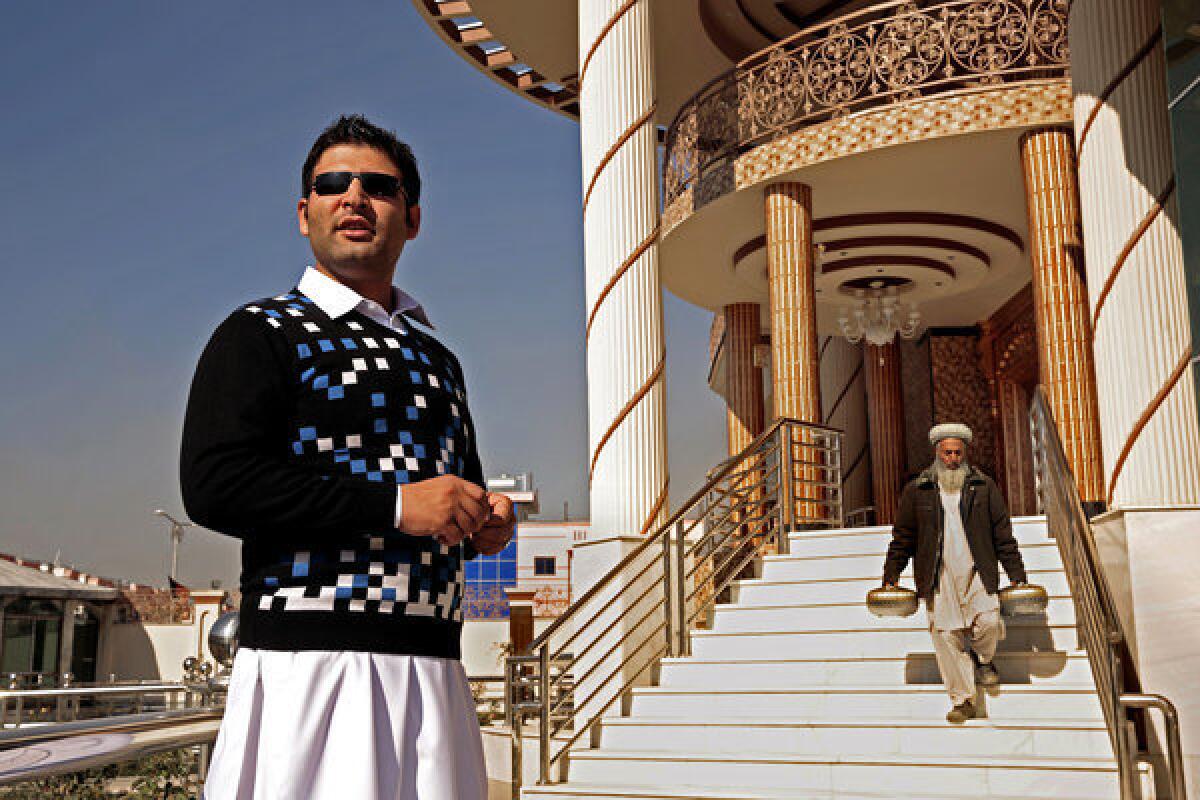
Saleem Caravan City, a glittering new gated community in Kabul, appeals to Afghans who, like its developers, are betting big on Afghanistan’s future.
- Share via

If Mohammed Ibrahim Caravan smells fear about Afghanistan's future, he doesn't show it. He strolls around like a country squire in the glittering new gated community he helped build, dressed in a spotless white shalwar kameez tunic, stylish shades and polished wingtips.
"Worried?" the 28-year-old asked. "Hah — not me. I'm confident in the future. If you don't invest in your own country, who will?"
Caravan's company is plunging $160 million into the family-run Saleem Caravan City, with its rows of salmon-colored villas with balconies and rose gardens, like some ersatz Miami Beach condo community. He's moved his family into a lavish 7,500-square-foot mansion with a pool, hot tub and guest kitchen.
Two hundred of the 300 homes in the 160-acre complex have already sold, Caravan says. Buyers love the swimming pool, the two mosques, the school, the shopping arcade — and especially the security walls, augmented by a high-tech security system and armed guards.
Many Afghans are panicking at the prospect of U.S. combat troops pulling out next year. Their confidence is battered by lingering uncertainty over a U.S.-Afghan security pact that, if rejected, would leave no U.S. troops in the country and cut billions of dollars in aid. As the Taliban insurgency roils the countryside, many investors are fleeing. Businessmen send their families to Turkey, Pakistan and Dubai, United Arab Emirates, for safety.
But Caravan is betting big on Afghanistan. He's among a new breed of entrepreneurs here, young and energetic, in contrast to the paunchy warlords who dominated Kabul after the Taliban government was toppled in 2001.
Rising from the gray dirt on the capital's gritty eastern shoulder, Caravan City's walls protect the people who have the most to lose if Afghanistan's government collapses. Many of the buyers of the homes — at $250,000 to $300,000 a pop, cash only — are top officials in the government, army and police.
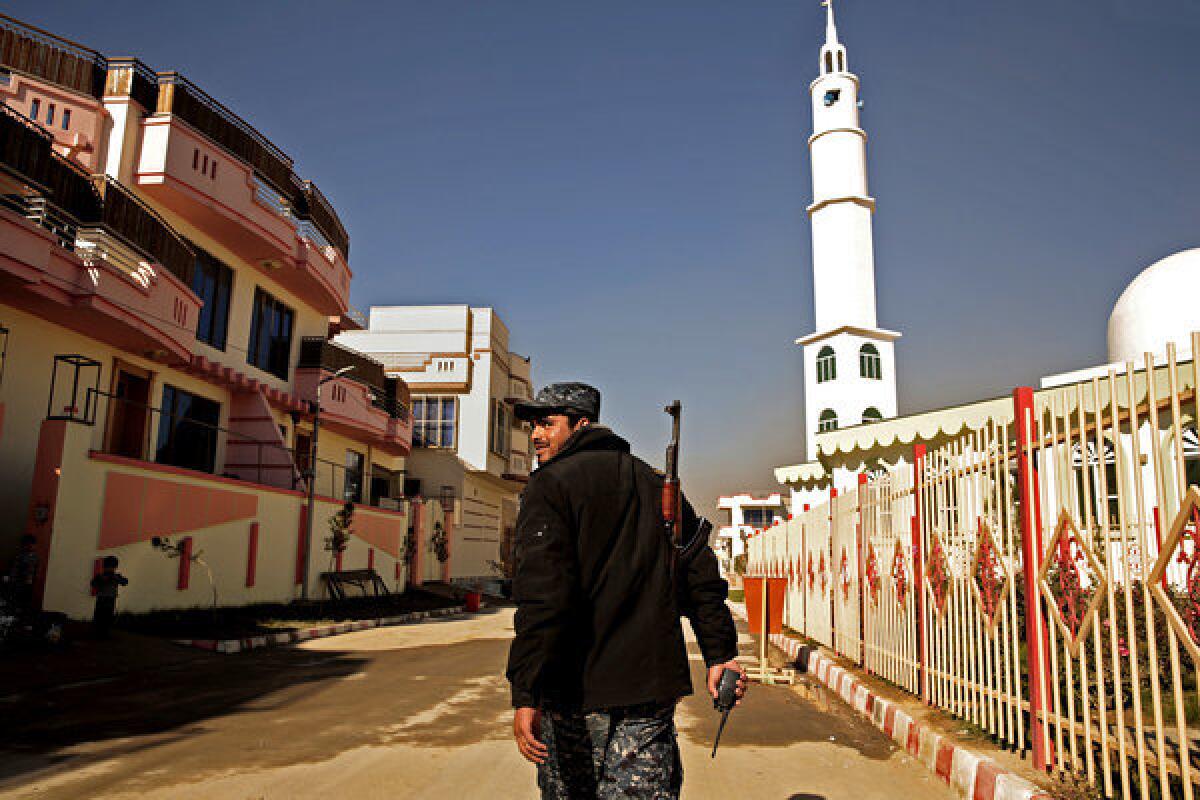
A security guard, one of dozens, patrols the Saleem Caravan City gated community. The armed guards are augmented by a high-tech security system. More photos
These elites live in fear of car bombs, snipers, assassinations, kidnappings and roadside explosives. Unlike most Afghans, they can afford a secure gated community.
Caravan chooses to portray their home purchases as signs of confidence, not fear.
"They're like me — they plan to live here with their families for a long time," he said.
Beyond the walls, a goat saunters past. Garbage and sewage clog the gutters. Grimy men hawk vegetables, donkeys pull rickety carts, and street urchins go through trash bins on rutted streets. Inside Caravan City, the roads are paved and marked by freshly painted street signs in Dari and English.
"My uncle lives here. My brother too. We're all confident about the future," said Caravan, an investor in and director of the company that runs Caravan City.
He said another uncle, Saleem, the company's owner, lives in Dubai for business reasons but also has a home in Caravan City.
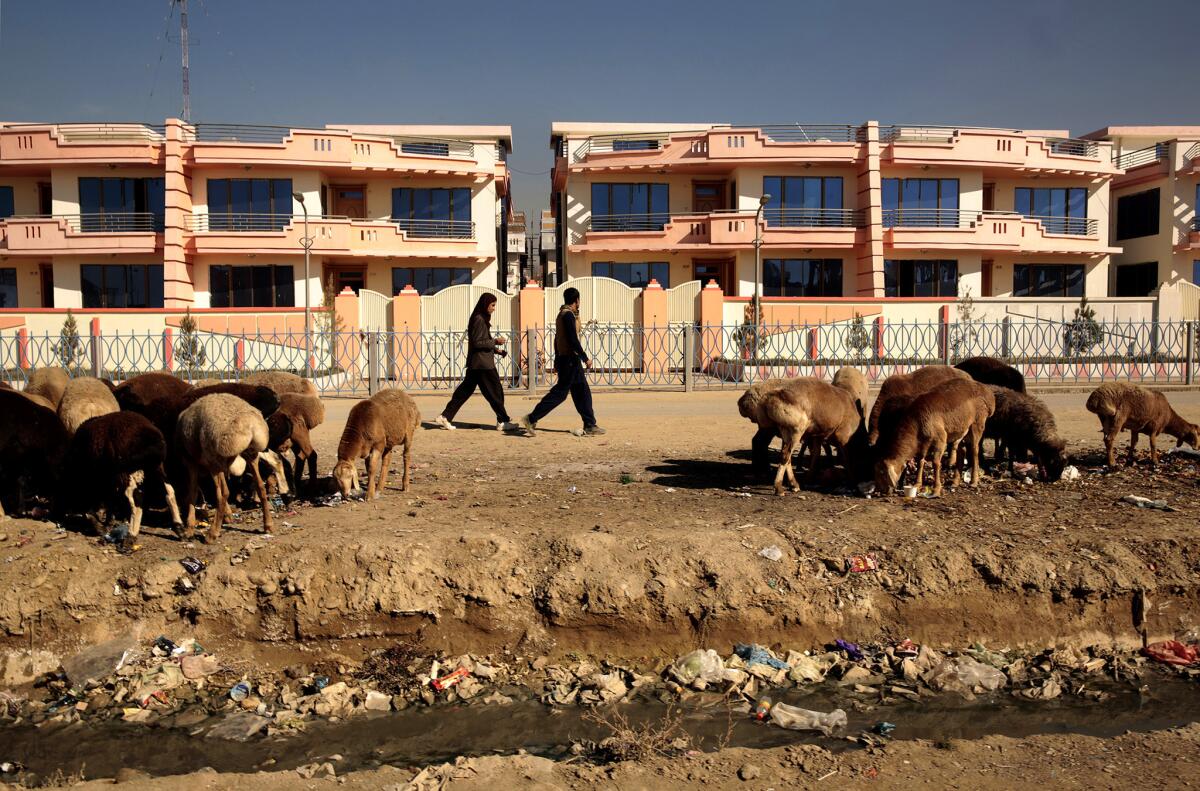
Goats graze on the edge of Saleem Caravan City. Garbage and sewage clog the gutters outside, but inside the gated community, the roads are paved and marked by freshly painted street signs in Dari and English. More photos
Yes, he knows that a real estate boom, pumped up by new "poppy palaces" built by fat cats with dubious opiate-enriched income streams, has burst and sent home values plummeting. And in an October report, the World Bank office in Kabul projected a sharp decline in Afghanistan's economic growth in 2014 due to "uncertainty surrounding the political and security transition." It noted that the country's economy was "highly aid dependent."
Caravan snorts at that kind of talk. Everything will be just fine if people don't panic, he says. He's so confident that he's building an 18-story apartment building with 180 units at $120,000 each, rising through the swirls of dust and the hustle of 1,500 Caravan City construction workers. He plans more expansion after that.
"I'm putting my money in my homeland, and all those frightened people should too," Caravan said as he welcomed guests into his gilded reception room, outfitted with flat-screen TVs in a space the size of a small auditorium.
If you look hard enough, you can find other pockets of optimism in Kabul in these perilous times. In a quiet compound amid the clatter and auto fumes of downtown Kabul, Farshid Ghyasi is plowing profits back into his business software company, Netlinks. The company runs an Internet job website and plans to open a business service portal soon.
No one wants to return to the way things were in the past. I believe in a different future."— Farshid Ghyasi
The faltering economy has trimmed his job website's profits by 60% this year, but Ghyasi, 32, says he's staying put, unlike many businesspeople, and keeping his wife and two young sons here.
The unstable Afghan government is his biggest single customer, so his very viability is at risk, he acknowledges. Without the U.S.-Afghan security agreement, Ghyasi said flatly, "this government would simply collapse."
Billions of dollars in foreign development and military aid have been pumped into Afghanistan; warlords and government cronies have looted millions while also profiting from the lucrative opium trade (estimated to be worth about $950 million a year, tax-free). Transparency International last year ranked Afghanistan the third-most-corrupt nation, after Somalia and North Korea.
Ghyasi hopes those days are fading. "No one wants to return to the way things were in the past," he said. "I believe in a different future."
Hamidullah Farooqi, a U.S.-educated economics professor, says wealthy investors are wobbling. "They have one foot in Kabul and one in Dubai," he said.
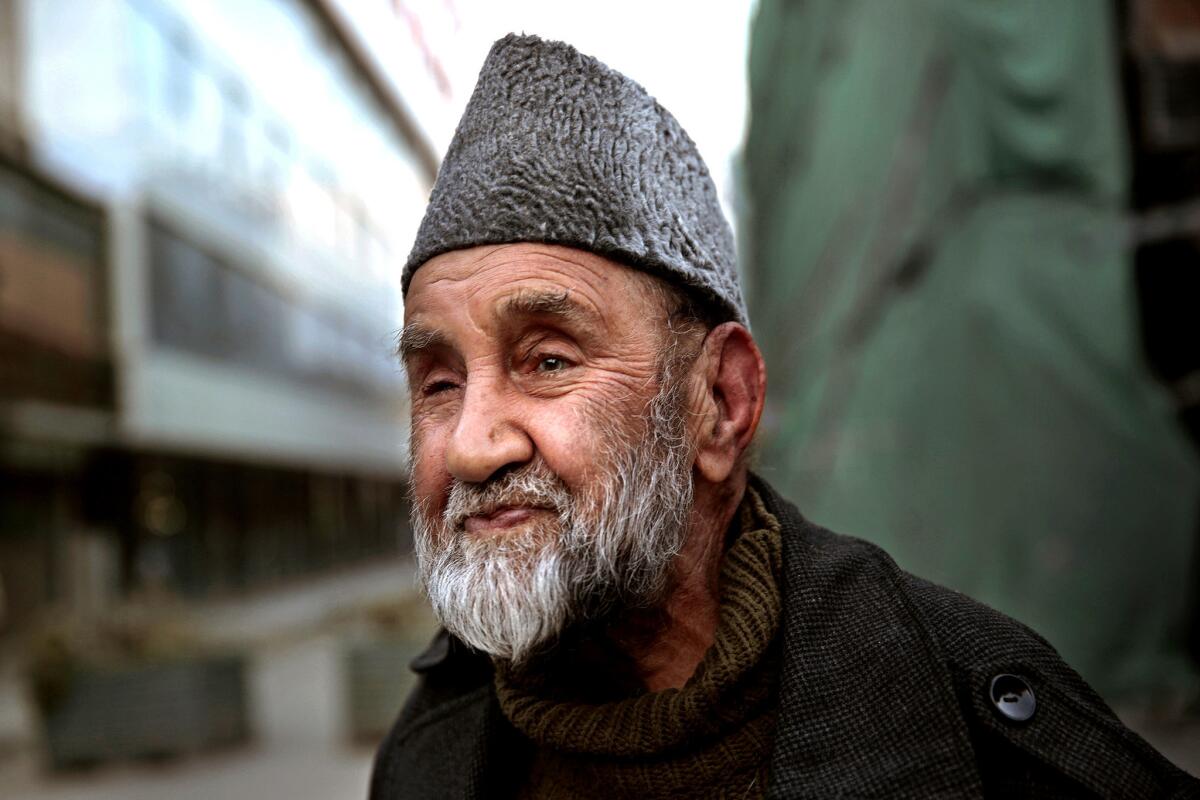
Haji Mohammed Aslam, 81, does not count himself among those who are worried that Afghanistan could once again be overrun by the Taliban or descend into civil war. More photos
Haji Mohammed Aslam, 81, a trim, sharp-tongued grandfather, bet big on Afghanistan two decades ago. He poured his life savings into a business that sold handicrafts to well-to-do Westerners.
But that collapsed and he lost his house when the Taliban rose to power in 1996, forcing Aslam and his family to flee to Pakistan. Two years after the Taliban's fall in 2001, he returned to Kabul.
Asked whether he's worried that Afghanistan could once again be overrun by the Taliban or descend into civil war, Aslam stirred his coffee and shrugged.
"My age doesn't allow me to worry," he said in lightly accented English. "But others do seem worried."
Haji Muzail Hotak is not among them. Hotak has moved his wife and seven children into a $250,000 Caravan City villa with eight bedrooms, six bathrooms and two lounges. Fears of impending doom after 2014 are "propaganda by the enemies of Afghanistan," he said.
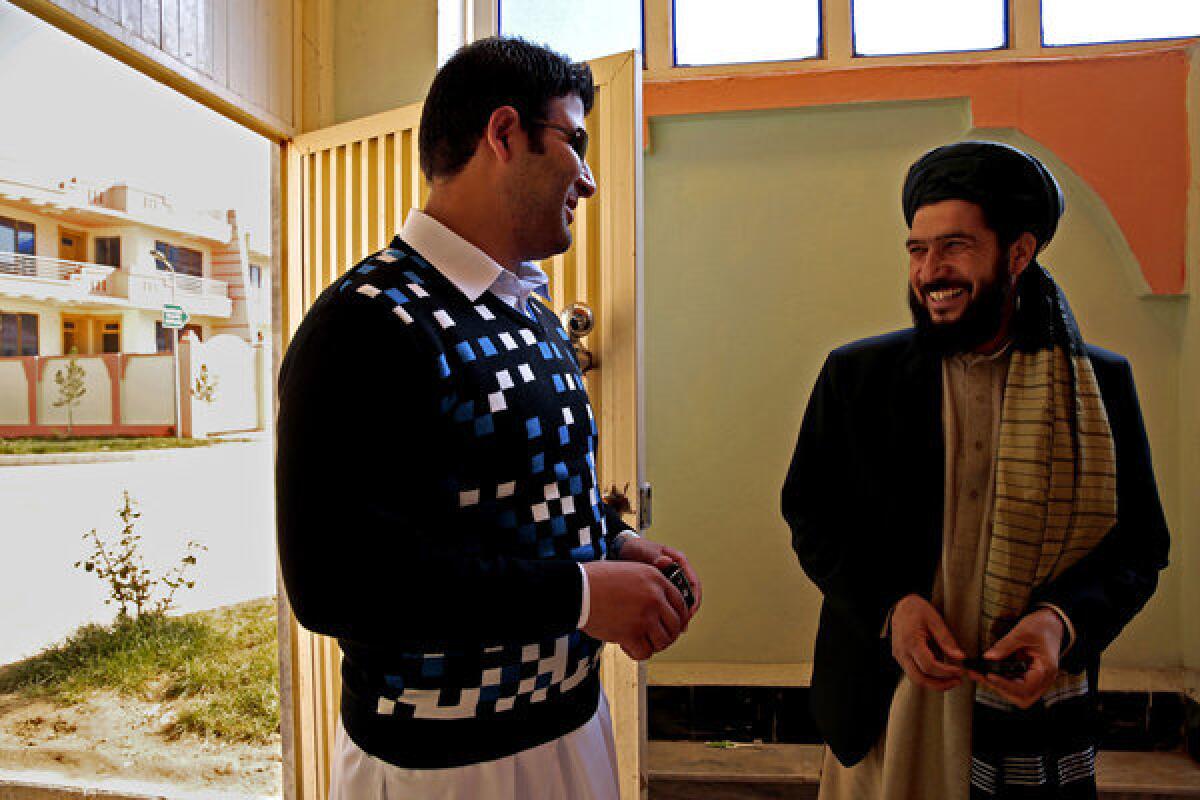
Mohammed Ibrahim Caravan, left, talks to new resident Haji Muzail Hotak, the leader of the Hotak tribe and father of seven, inside his home in Saleem Caravan City. More photos
"They want people to flee with their money so that they can take over Afghanistan," Hotak said, referring to the Taliban and their backers in Pakistan. He says he didn't cut and run in 1996, and he won't flee now.
Hotak finds comfort in the amenities of Caravan City, not to mention the security. Soon, anyone entering on foot must be cleared by a thumbprint scan. Homeowners use electronic remote controls to open security gates without leaving the safety of their cars, still a relative novelty in Afghanistan. A metal fence surrounds the development, and the villas are protected by 5-foot concrete security walls.
"These are dangerous times," Hotak said as he watched his children scamper across his unfinished courtyard.
Hotak is a powerful fellow. He's the leader of Afghanistan's Hotak tribe. Stout and stern, he owns a profitable company that sells women's clothing and plastic piping.
He's expanding his business, he says, and refuses to cut back like those he believes are of weaker will and lesser faith. He's betting on a long and happy life with his family right here, safe behind the towering walls and armed guards of Caravan City.
Follow David Zucchino (@davidzucchino) on Twitter
Follow @latgreatreads on Twitter
More great reads
Traditional craftsmen restore Korean Friendship Bell
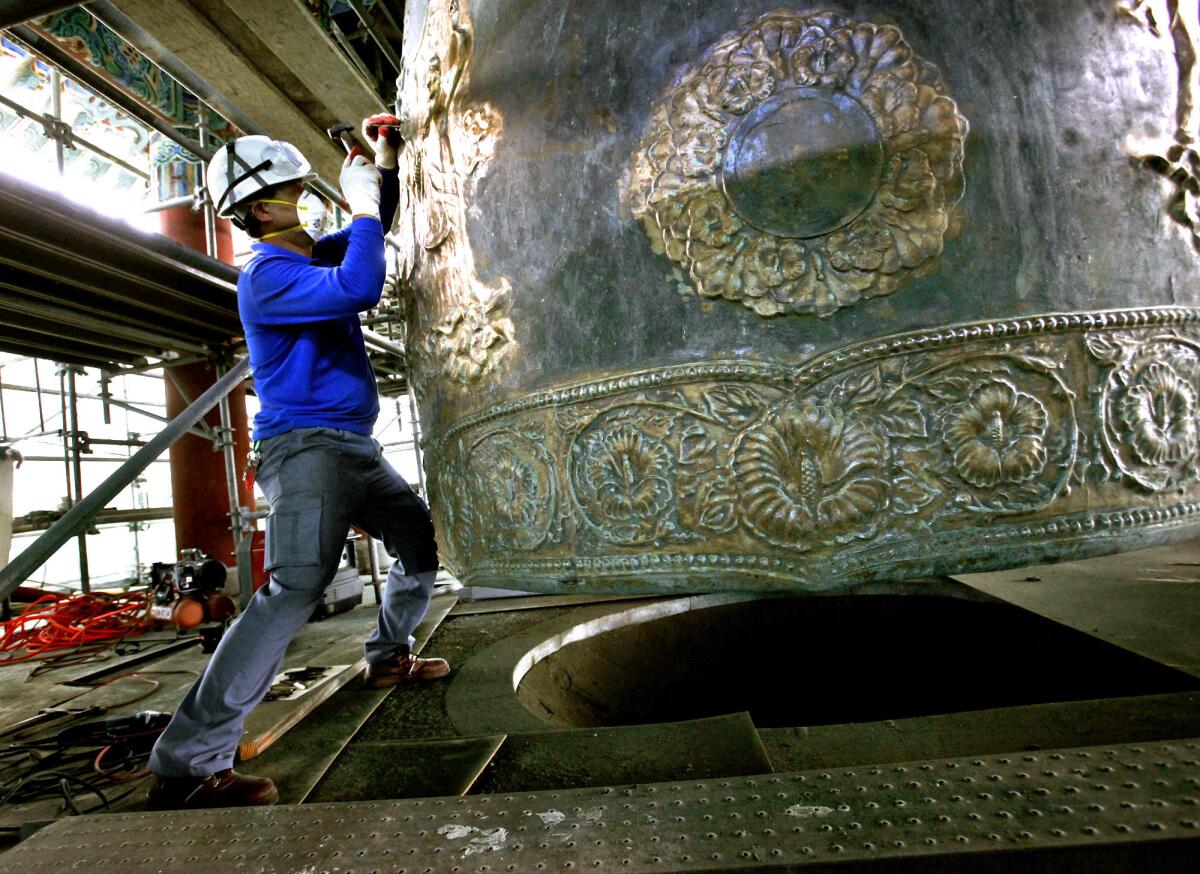
May this bell ring and sound forth the hope and resolve of our two nations."
A healthcare navigator in unfriendly waters
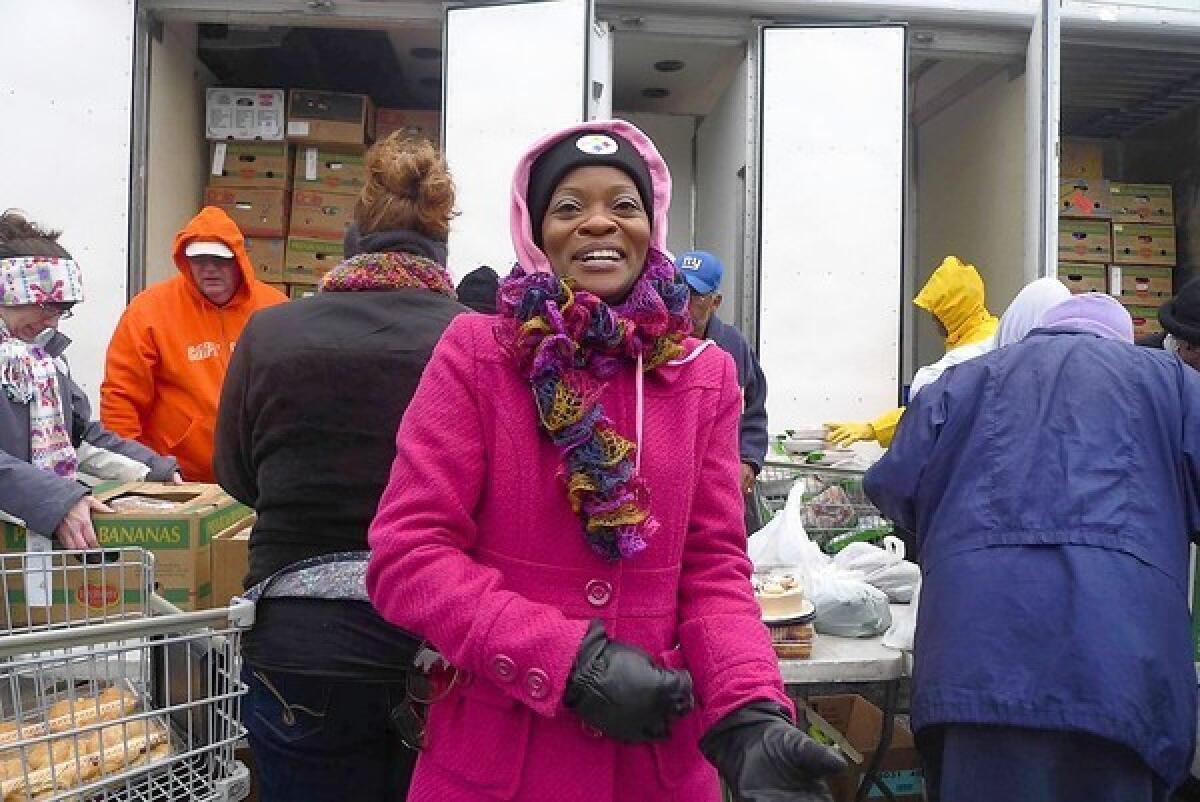
I don't feel that the law was designed for people to go sign up on a whim. It takes education."
Tiny museum in New York showcases the ordinary
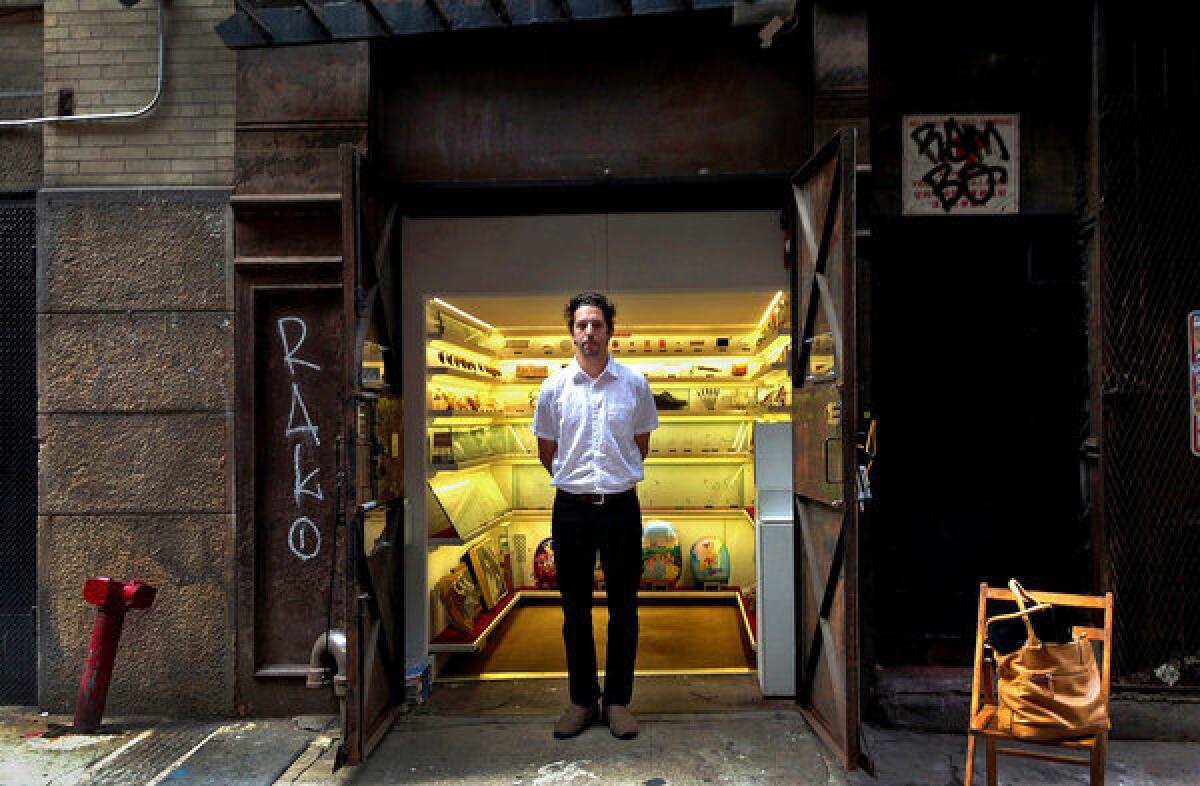
Sign up for Essential California
The most important California stories and recommendations in your inbox every morning.
You may occasionally receive promotional content from the Los Angeles Times.








